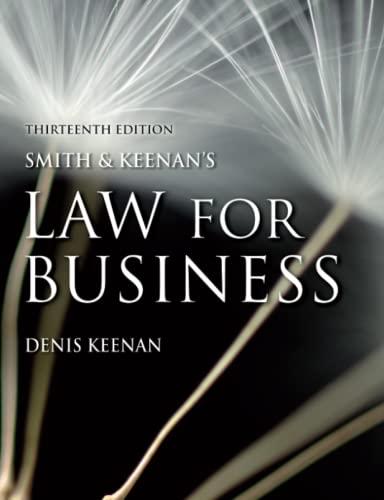Question
Would you please comment on this discussion and add your thoughts? Covid-19 has been an emerging infectious disease that has posed vital ethical challenges quickly
Would you please comment on this discussion and add your thoughts?
Covid-19 has been an emerging infectious disease that has posed vital ethical challenges quickly and dramatically. With such an infectious disease causing deaths, a declaration of state of emergency is appropriate in controlling the widespread and declining deaths. Given the surge in cases, the state of emergency would include orders such as stay at home, wearing a mask in public, no electives surgeries, social distancing, etc. This emergency would however, need to be implemented in an ethical and legal matter to balance public health and civil liberties. This decision of declaring state of emergeny must involve leaders, physicians, and other experts as the order could violate individual autonomy due to limited expression of self-freedom. These orders however, would be to benefit the public's health. To avoid harm, health agencies and organizations must plan to implement crisis standard of care which must be part of a system wide approach in decision-making. The ethics of restricting social contacts or freedom of interaction need consideration. In this case, it is the health authorities of the government who decide what constitutes a legitimate and fair process. However, the key elements of fair process would involve clarity about the ground for decisions, appeals for rationale that are acceptable for meeting the health needs fairly, and procedures for revising decisions in the light of challenges to them (Aliyu, 2021). People would be more likely to accept and adhere to decisions if they know of the grounds for such decisions.
Health officials must recognize the key elements to effective state of emergency is to socially support individuals by providing food and medical care, this could help the choice to stay home. They would also need to be provided with economic support as they would need to stay home and maintain social distancing (Cohen, 2020). In this current pandemic, inequity is a big ethical concern. Inequities in exposure, vulnerability, and consequences of the virus are apparent. The main causes of these inequities are the disparities in social determinants of health such as income, gender, and ethnicity. These disparities lead to inequities in exposure to the virus, vulnerability to the virus, and its consequences. Certain populations, due to their socioeconomic conditions cannot adhere to certain public health measures, such as social distancing or staying at home. Therefore, health policies should be backed up with the support of public policies, such as food security programs and unemployment insurance that can permit these populations to adhere to public health measures (Saleh et al., 2021).
Regarding vaccination for all state employees, health care workers, and educators this should not be mandatory. Public health should strive to implement the least restrictive intervention when possible, yet vaccine mandates are the most restrictive, intrusive form of vaccine policy. Ethical debate on vaccine mandates consistently suggests that unless all other reasonable means have failed (or are likely to fail) to increase vaccine uptake and/or decrease disease transmission by other means to an acceptable level, mandates should not be implemented. This requires institutions to consider whether they have pursued all possible interventions and support mechanisms for preventing infection even without a vaccine intervention (Gur-Arie, Jamrozik, & Kingori 2021). Individuals have the right to refuse getting vaccinated, especially if it goes against their morals and/or religious beliefs. The Model Act seeks to "grant public health powers to state and local public health authorities to ensure strong, effective, and timely planning, prevention, and response mechanisms to public health emergencies (including bioterrorism) while also respecting individual rights", but it recognizes individuals may be unable or unwilling to undergo vaccination "for reasons of health, religion, or conscience," and provides that such individuals may be subject to quarantine to prevent the spread of a contagious or possibly contagious disease (Cole & Swendiman, 2014). It must be understood those who are vaccinated can still get the disease and also spread it. Individuals should definitely be encouraged and educated to voluntarily get vaccinated, but not mandated. Individuals might be hesistant or against being vaccinated for various diverse and complex reasons, and their autonomy should be fully respected. Finally, governments must make sure that those affected by restriction orders are taken care of through the provision of basic needs without discrimination in an equitable manner.
References
Saleh, B. M., Aly, E. M., Hafiz, M., Abdel Gawad, R. M., El Kheir-Mataria, W. A., & Salama, M. (2021). Ethical Dimensions of Public Health Actions and Policies With Special Focus on COVID-19.Frontiers in public health,9, 649918. https://www.frontiersin.org/articles/10.3389/fpubh.2021.649918/full
Aliyu A. A. (2021). Public health ethics and the COVID-19 pandemic.Annals of African medicine,20(3), 157-163. https://www.ncbi.nlm.nih.gov/pmc/articles/PMC8477289/
Cohen, J. (2020). Individual freedom or public health? A false choice in the covid era. The Hastings Center. https://www.thehastingscenter.org/individual-freedom-or-public-health-a-false-choice-in-the-covid-era/
Gur-Arie, R., Jamrozik, E., & Kingori, P. (2021, February 1). No jab, no job? ethical issues in mandatory covid-19 vaccination of healthcare personnel. BMJ Global Health. Retrieved May 31, 2022, from https://gh.bmj.com/content/6/2/e004877#article-bottom
Cole, J., & Swendiman, K. (2014) "Mandatory Vaccinations: Precedent and Current Laws." Congressional Research Service Reports. https://sgp.fas.org/crs/.
Step by Step Solution
There are 3 Steps involved in it
Step: 1

Get Instant Access to Expert-Tailored Solutions
See step-by-step solutions with expert insights and AI powered tools for academic success
Step: 2

Step: 3

Ace Your Homework with AI
Get the answers you need in no time with our AI-driven, step-by-step assistance
Get Started


